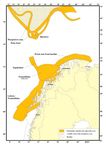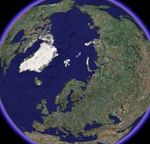The Norwegian ecosystem-based management plan for the Barents Sea and sea areas off the Lofoten Islands
←
→
Page content transcription
If your browser does not render page correctly, please read the page content below
The Norwegian ecosystem-based
management plan for the Barents
Sea and sea areas off the Lofoten
Islands
By: Dr. Erik Olsen,
Research Scientist
The Barents Sea
•Continental shelf sea
•Average depth 230m
•Area covered by
management plan is
1.4mill km2
1Valuable and sensitive areas
• Lofoten Islands
– Spawning grounds for cod, haddock and
other species
– Seabird colonies and high densities of
marine mammals
– Tentative UNESCO world heritage site
• Tromsøflaket bank area
– Retention area for fish-eggs and -larvae
• Polar front
– High primary and secondary production
giving ample prey for larger species (i.e.
fish, seabirds, whales)
• Marginal ice zone
– Rich community of algea and other
organisms, high primary and secondary
production
• Finnmark, 50 km zone from the baseline
– Many important seabird colonies
• Eggakanten
– Edge of the continental shelf
Main impacts up to 2020
• Petroleum industry: its expansion will be the main change
in human activity in this period. Possible impacts from oil
spills and risks related to rising transport volumes.
• Fisheries: management is currently based on the
precautionary approach. IUU fishing and insufficient control
may have serious impacts on resources, environment, trade
and local communities
• Long-range transport of pollutants: the situation in 2020
is likely to be unchanged from 2006. Inputs of "old"
hazardous substances are expected to decrease, but they
are already dispersed and degradation is slow. Inputs of
"new" hazardous substances are expected to increase.
• Introduction of alien species: this is a serious threat,
which will increases as tanker traffic increases. May result in
substantial changes in ecosystems.
• The greatest long-term challange is climate change.
3Goals
• Safeguard marine ecosystems to ensure
long-term value creation
• Ensure that activities in the area do not
threaten the natural resource base or
opportunities for value creation in the future
• Goals have been set for:
– Pollution
– Biological diversity
– Value creation through economic activity
– Safe seafood
– Acute oil pollution/environmental risk
Goals (cont.)
• Prevent or limit pollution
– Build up knowledge
– Follow up and develop international initiatives
– Ensure zero discharges of pollutants and produced water from petroleum
activities (”Zero-discharge goal”)
• Ensure that seafood is safe
• Reduce the risk off and take steps to prevent oil spills
– Ensure a satisfactory level of oil spill preparedness (tug capacity etc)
– Enhance maritime safety
• Mandatory routeing and traffic separation schemes
• Maintain biodiversity at all levels
– Take steps to protect particularly valuable and vulnerable areas
– Manage commercial resources (e.g. fish) according to the precautionary
principle
– Avoid introduction of alien species
– Maintain and safeguard nature types and habitats
– Survey benthic habitats and introduce measures to minimize impacts on
valuable and critical habitats
4Scientific basis and knowledge gaps
• There is a sound scientific basis for
the management plan, but gaps in our
knowledge have been identified and
the following priority tasks identified:
– Mapping of the bottom habitat
– Studies of ecological interactions
between species and components of
the ecosystem (energy flow)
– Studies of effects of pollutants
• Measures to be introduced:
– A better coordinated environmental
monitoring system, to monitor the
state of the ecosystem and
environmental trends (indicators,
reference values, action thresholds)
– Expansion of research activity and
surveys
– Steps to fill gaps in our knowledge:
activities under the Research Council
of Norway
Implementation, cooperation, revision
• Implementation
– Cooperation between ministries and
subordinate institutions
• Annual reporting
• Revision in 2010
• Forum on Environmental Risk
Management
• Dynamic plan, new knowledge will
be included at each revisions
– Basis for previous decisions will be
reassessed
• International cooperation
– Regional level: cooperation on
management of the whole
ecosystem
5Additional information
• In English:
– Press release
– Summary chapter
– Presentation by the Minister of the Environment
– can be downloaded from:
http://www.dep.no/md/english/topics/IntegratedManagement
BarentsSea/bn.html
• In Norwegian:
– The white paper and all background documents can be
downloaded from:
http://www.dep.no/md/norsk/tema/svalbard/barents/
6You can also read

























































